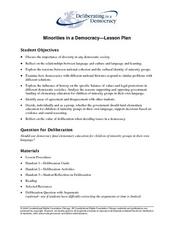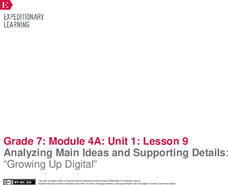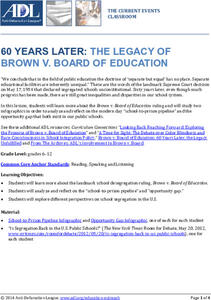Deliberating in a Democracy
Minorities in a Democracy
Learners consider diversity in democracies. In this democratic values lesson plan, students read an article titled, "Minorities in a Democracy." Learners respond to discussion questions about the article.
Scholastic
Marijuana: Breaking Down the Buzz
There are a lot of myths surrounding marijuana. Read a passage that clarifies the dangers of teens smoking marijuana, its harmful effects on the development of the brain, and the possible correlation of cigarette smoking to marijuana...
EngageNY
Analyzing Main Ideas and Supporting Details: “Growing Up Digital”
Young scholars continue their exploration of adolescent brain development by reading an informational text, "Growing Up Digital," by Matt Richtel. Then, with partners, they complete note-catcher worksheets to capture the article's main...
Curated OER
Identify the Parts of a Newspaper features of informational text, newspaper format
Young readers make sense out of the wealth of information in newspapers with this helpful reference document. Pointing out basic features like headings, articles, bylines, and captions this resource is a...
Constitutional Rights Foundation
Naturalized Citizens and the Presidency
Article II, Section 1 of the U.S. Constitution takes center stage in a lesson that asks class members to assume the role of state senators, debate a resolution to amend the U. S. Constitution to permit naturalized citizens to run for...
Curated OER
Mission Complete, Houston
It was a bittersweet event when the space shuttle Atlantis touched down for the last time on July 21, 2011. Space science learners read an article about this event in The New York Times and then write answers to who, what, where, when,...
Curated OER
Casting Doubt: "Color-blind" and Nontraditional Casting Decisions
In his article about color-blind casting entitled, "Willy Loman Is Lost, Still Looking for Stimulus Plan and Some Dignity," Charles Isherwood quotes August Wilson as saying, "To mount an all-black production of a 'Death of a...
Facing History and Ourselves
Reflection and Action for Civic Participation
Slacktivist or activist? Bystander or upstander? Positive social change requires involvement and commitment. After reading a series of articles about young people who chose to get involved, scholars examine a framework that helps peers...
Nemours KidsHealth
Media Literacy and Health: Grades 9-12
An essential skill for 21st-century learners is to know how to find reliable sources of information. Two activities help high schoolers learn how to determine the reliability of health-related news from websites, TV, magazines, or...
Anti-Defamation League
60 Years Later: The Legacy of Brown v. Board of Education
Although the 1954 U.S. Supreme Court decision Brown v. Board of Education declared segregated schools unconstitutional, huge inequalities still exist in U.S. public schools. Learners analyze and discuss data presented in two...
K12 Reader
What Is Gravity
This cross-curricular reading comprehension worksheet asks kids to read a short passage about gravity and then to answer questions about the article.
K12 Reader
Color Shows Mood
Colors, primary colors, secondary colors, neutral colors, mixing colors, the color wheel. As a reading comprehension exercise, kids read a short passage about colors and then answer a series of questions based on the article.
K12 Reader
The Scientific Method
The scientific method is the focus of a reading comprehension exercise that provides readers with a short description of the steps, and then asks them to respond to a series of questions based on the article.
K12 Reader
Poetry Uses Rhyme
It's rhyme time! After reading a short article about poems that rhyme, kids take the time answer questions about the message of the passage.
K12 Reader
Congruent Geometric Shapes
Here's a reading comprehension worksheet that focuses on congruent geometric shapes. After reading a short article about congruent figures, kids respond to a series of comprehension questions.
K12 Reader
Extending Patterns
2, 4, 6, 8. What comes next? This reading comprehension worksheet discusses patterns and extending patterns. After reading the short article, kids answer a series of questions to demonstrate their understanding of the passage.
K12 Reader
Identifying Geometric Solids
After reading a short passage that identifies different types of geometric solids, kids answer a series of questions using information found in the article.
K12 Reader
Microscopes Magnify Things
After examining a short article about light microscopes, readers record their responses to a series of comprehension questions based on the text.
K12 Reader
Shapes on a Plane
Geometric shapes are the focus of a comprehension exercise that asks readers to examine a short passage about planes, circles, triangles, and rectangles, and then to respond to a series of questions about the article.
K12 Reader
Absolute Location
Where in the world are we? As a reading comprehension exercise, kids read a short passage about navigation using latitude and longitude, and then respond to a series of questions based on the article.
K12 Reader
Exponential Notation
Standard notation, exponential notation, base numbers and exponents are featured in an article designed to be used as a reading comprehension exercise. Kids read the passage and then respond to the comprehension questions attached to the...
K12 Reader
Stalagmite Stalactite
The difference between stalactites and stalagmites, and how both are formed, is the subject of a cross-curricular reading comprehension worksheet that asks kids to read the passage and then respond to comprehension questions based on the...
K12 Reader
Extreme Weather
Thunderstorms, tornados, blizzards, hurricanes. These extreme forms of weather are the focus of an article on a two-part reading comprehension worksheet. After reading the passage, kids use information in the text to respond to a series...
K12 Reader
Bartering for Basics
A passage about bartering practiced by early Native American tribes provides the text for a reading comprehension activity that asks kids to use information from the article to answer a series of comprehension questions.























